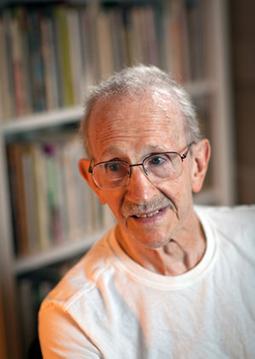When a new poet laureate is named, readers head to their bookshelves, certain they must still have that dusty collection purchased long ago. Booksellers head to the poetry section, fearing they returned the writer's books during that last big cull. Publishers head to their computers and check inventory, knowing an order blitz is already headed their way.
I confess my reaction is usually a restrained, "Good for him (or her)." It's nice to see acknowledgment for someone's body of work, and if that poet happens to be one I like, maybe I feel just a little better and even check my own bookcases.  But this week Philip Levine was named the poet laureate of the U.S. and I'm excited. Levine's work matters to me. I've read him for a long time. When I heard the news of his appointment, my first thoughts were not about the Library of Congress or more poetry-in-the-schools initiatives. They were about work and reading, and how those two words became the essence of my life, made me, inevitably, one of Levine's readers.
But this week Philip Levine was named the poet laureate of the U.S. and I'm excited. Levine's work matters to me. I've read him for a long time. When I heard the news of his appointment, my first thoughts were not about the Library of Congress or more poetry-in-the-schools initiatives. They were about work and reading, and how those two words became the essence of my life, made me, inevitably, one of Levine's readers.
"I worked for Cadillac, in their transmission factory, and for Chevrolet," he told the Paris Review in 1988. "You could recite poems aloud in there. The noise was so stupendous. Some people singing, some people talking to themselves, a lot of communication going on with nothing, no one to hear."
I never worked in a car factory, but I worked in a marble mill for a little while and I worked in a supermarket for a long time. I know what hard work is. I also know how hard not having work is. I know that words can sometimes capture this toughness and the complicated pain/pleasure of aching bones and mind--an odd combination of power and powerlessness. I know that words often saved me, as did work. A long time ago, I discovered Levine had found some damn good words of his own.
waiting at Ford Highland Park. For work.
You know what work is--if you're
old enough to read this you know what
work is, although you may not do it.
Forget you. This is about waiting,
shifting from one foot to another.
He is, as they say, the right man for the job. I'm sure many people have already noted the logic of his appointment at a time when unemployment is a freight train; when the working world Levine has chronicled in his poetry is vanishing so fast his poems often read like fierce elegies.
For the past six years, I taught an English Comp. course at a community college in southern Vermont. Many of my students had lousy jobs or were unemployed; just looking for a break, another chance, a fresh start, whether they were 23 or 43. Work was one of the things I asked them to write about. We read Levine's "What Work Is" together. They already knew what work is. Levine's poem is intricate, but they worked their way through it with me. If a poem can be "gotten," some of them got it. And if they never read another poem, they really read this one.
and of course it's someone else's brother,
narrower across the shoulders than
yours but with the same sad slouch, the grin
that does not hide the stubbornness,
the sad refusal to give in to
rain, to the hours wasted waiting,
to the knowledge that somewhere ahead
a man is waiting who will say, "No,
we're not hiring today," for any
reason he wants.
In the Paris Review interview, Levine described Detroit in the late '80s as a city where "nothing grandly heroic is taking place... Nothing epic. Just the small heroics of getting through the day when the day doesn’t give a shit, getting through the world with as much dignity as you can pull together from the tiny resources left to you. It’s the truly heroic. The poem ["A Walk with Tom Jefferson"] is a tribute to all these people who survived in the face of so much discouragement. They’ve survived everything America can dish out. No, nothing grandly heroic is happening in Detroit. I guess nothing grandly heroic ever took place there; it was always automobiles, automobiles, hard work, and low pay."
This is definitely the guy I want to be our poet laureate right now.--Robert Gray (column archives available at Fresh Eyes Now)
Photo: Craig Kohlruss /Fresno Bee

